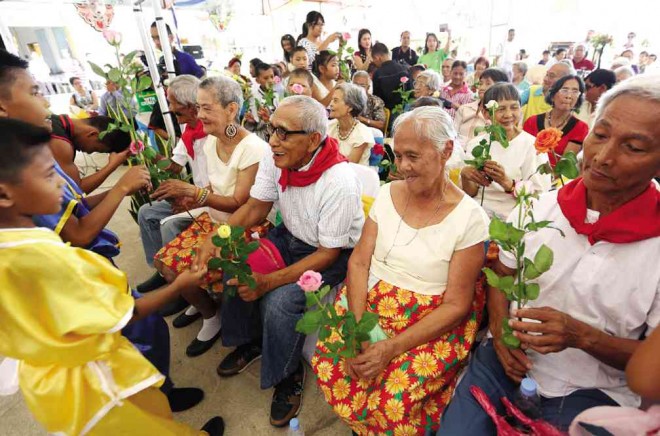
Elderly people staying at the center entertain visitors during the facility’s founding anniversary. The DSWD is hoping that more visitors will come to the shelter and interact with residents. NIÑO JESUS ORBETA
MANILA, Philippines–An ongoing rehabilitation program hopes to turn a care facility for the elderly in Tanay, Rizal, into a tourist attraction, giving visitors a chance to interact with senior citizens who have been left to fend for themselves in their twilight years.
Haven for the Elderly manager Ricky Bunao told reporters during the center’s commemoration of its fifth founding anniversary last week that they were in the middle of implementing a 15 “wonders” program on the nine-hectare facility managed by the Department of Social Welfare and Development.
An ongoing rehabilitation plan aims to transform the center which serves as a temporary home for abandoned, neglected and unattached Filipino seniors into a tourism destination. NIÑO JESUS ORBETA
Of the 15 items on the list, around half have been completed, including an organic farm, greenhouse, herbal and ornamental gardens and an elderly living area. Still in the works are parks, gardens, a swimming pool, an auditorium and areas for team-building activities, among others.
With the availability of these facilities, Bunao said the center was hoping to attract people looking for a venue for office activities, outreach programs or team-building programs and, at the same time, spend time with the elderly residents.
Social Welfare Secretary Corazon “Dinky” Soliman stressed during the founding anniversary celebration that more than financial support and services, the senior citizens at the center needed interaction with other people.
“Nothing can compare to a visit [to the elderly residents]. All those who have time, you can come here to visit and talk” [with them] while enjoying the picturesque view offered by the facility, Soliman said. She added that a simple conversation would mean a lot to the senior citizens.
The facility, formerly known as the Golden Acres, was based in Quezon City before it was transferred to the hilly town of Tanay in 2010. From an initial 60 residents, it now looks after the well-being of 239 senior citizens housed in 19 cottages.
Last year, Bunao said that 283 elderly persons were under their care. Of this number, only 12 were reintegrated with their family while 25 others remained there until their deaths.
Residents of the Haven for the Elderly get the special treatment as the center in Tanay, Rizal, marks its founding anniversary. NIÑO JESUS ORBETA
According to Soliman, the facility is only a temporary home that provides rehabilitation services for abandoned, neglected and unattached senior citizens as they await reintegration with their kin.
“However, based on our experiences, it’s hard to reintegrate them because they were left to fend for themselves by their families. For those who will not be reintegrated [with] their families, we will care for them till death,” she added.
The facility—which has a staff of 91, including caregivers, therapists and social workers—provides the residents various health services, sociocultural and recreational activities, as well as therapy, among others.
It has a budget of P14.9 million which is mostly allocated for the residents’ food.
For their vision to become a reality, Bunao said that they were open to partners who could help develop the facility.
Recently, a mobile company’s foundation inaugurated a greenhouse project which it sponsored to help the center’s organic farming program.
Sen. Pia Cayetano, who sponsored in the Senate Republic Act No. 9994, or the Expanded Senior Citizens Act, acknowledged the facility for providing “a wholesome and nurturing environment” for the elderly, as well as giving them “high quality care, support and social protection.”
“It is imperative that we recognize their rights and do what we can to promote their welfare and overall well-being,” Cayetano said in a statement, acknowledging their valuable contribution to society in their prime.